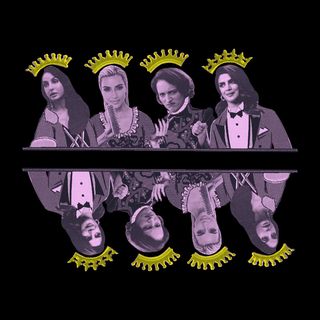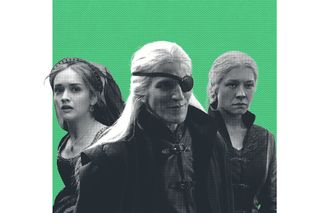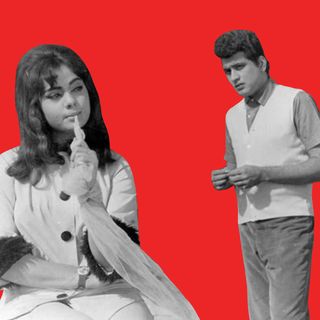
House of the Dragon Has No 'Smart' Characters. That’s a Good Thing
With all the foolhardy schemes wreaking chaos this episode, House of the Dragon turns into a tragi-comedy that represents today's politics better than Game of Thrones ever did.

This article contains spoilers for season 2, episode 2 of ‘House of the Dragon.’
There is no better moment to encapsulate the sheer numbskullery of the plots in the second season of House of the Dragon’s (HOTD) than the one at the halfway mark of its second episode. Otto Hightower, Aegon Targaryen’s Hand and guy on perpetual job probation, finds out that an assassination scheme is afoot, straight from the brain of Ser Criston Cole (guy who should be on probation). Otto closes his eyes, sheer disgust and disbelief on his worn face, as centuries flash before him, perhaps even the series ending of Game of Thrones, before he asks, taking an eternity to enunciate each word: "and what... has Ser Criston Cole done?"
To recap: this is a story of how the greatest house in the mythical land of Westeros imploded. There are misunderstandings, blood feuds, lies, and deceptions. Where we’re currently at is the knife’s edge before a nuclear level dragon-extinction event unfolds. But with this episode, HOTD has gone from a show about juicy plots to a show about the catastrophic absurdity of letting idiots be in charge.
After the previous episode’s ill-conceived scheme to kill a son – any son – in Camp Green takes place, Otto Hightower takes advantage of a gruesome tragedy for some political maneuvering. He orchestrates a public funeral procession, weaponizing the tears of his daughter and granddaughter, Alicent Hightower and Helaena Targaryen, respectively. A town crier calls upon the public to look upon the works of Rhaenyra Targaryen, the cruel, defiler of innocents. So far, so good.
However.
Not only does Aegon then go on to publicly execute all the city’s ratcatchers in order to kill the one (one!) who was an accomplice in his son’s murder, but also Ser Arryk is on his way to a suicide mission, as they speak, to ostensibly kill Rhaenyra (but really, to take the heat off the Internet’s enemy #1, Criston Cole). And it is in the moments before Otto finds out that the show pauses to take in the magnitude of stupidity that abounds everywhere. Where are all the smart people?
It is true that a civil war tearing a family apart doesn’t just happen without some tragically avoidable silliness (like Alicent’s confirmation bias deceiving her near her husband’s deathbed). It is arguably the point of the source material: George R.R. Martin, as the pioneer of anti-fantasy fantasy, is clear about the thesis that the road to the throne is paved with avoidable tragedies for society as a whole. Even the second episode in HOTD makes a point of this many times, like with a scene in Hugh’s household, with his sick child and depleting house inventory, or the anguish of the ratcatcher’s mother finding her son executed – not allowed the grace, sympathy, or stateliness that Halaena was when her son was killed.
It is more than GoT did to portray the misery of the general public: they were usually relegated to the margins in a story primarily concerned with interesting us with which family acquires the prized Iron Throne. And so we had Tyrion Lannister, Varys, and Littlefinger sparring with each other in deliciously loaded euphemisms, hatching devious schemes in their perpetual one-upmanship and, as a consequence, making the politics of it all far more interesting. Interesting in a way that was slick and undeniably cool but didn’t often allow us to stop and consider: who is all this for? Sure, over eight seasons, GoT did make throwaway mentions to “the good of the realm.” But what is the good of the realm? Certainly not blood, guts, and glory.
HOTD has not much of an interest in blood, guts, and glory. We never see Aegon bludgeon Blood to death. We don’t catch a glimpse of a child in its decapitated state. Instead, HOTD lingers on the aftermath of such violence and the moral compass one is forced to shed in order to maintain power against all costs, even if those costs are your own family. Helaena being forced to perform her grief in front of the public merely hours after she had to save a child and sacrifice the other serves no other purpose but propaganda. The scene of the procession plays out in a manner priming the audience to expect something gruesome, in GoT fashion (surely a sizeable number of viewers thought Jahaerys’ head would roll off during the proceedings). But nothing happens, because the procession is the point, is the horror.
If the procession is the horror, Aegon’s and Criston’s buddy-cop undoing of all of it is the farce. That’s two blunders in one episode for Team Green. Back in Team Black HQ, however, Daemon skulks around after a dressing down from Rhaenyra, who finds out it was his bright idea to not pay attention (deliberately or not) to whom he plotted to assassinate. Perhaps this was in furtherance of his own interest in a war, but his intentionality doesn’t make it less stupid. Killing a toddler instead of a grown man doesn’t bode well for the side he is on and, by extension, for him. Nobody except Rhaenyra, Otto, and Alicent, it would seem, understand the importance of such things as optics, judiciousness, restraint, or the moral high ground. But with hot-blooded men given free reign to run amok, once again, it is the smallfolk who truly suffer the most.
There’s a reason the Internet lit up with memes about the moment Rhaenyra finds out Daemon is an unhinged shit-stirrer, or Otto being Westeros’ Kris Jenner (the popager? Grandsire-entrepreneur?). It’s because HOTD is a tragi-comedy. The show is at its ideologically sharpest when it sits in the silence of several beats to allow the foolishness to dawn upon everyone. And when the tension breaks, it’s not cathartic so much as it is the release of gallows humour. No number of baths Alicent takes can wash off her sins or the cutting indifference of her father when she wanted to confess them: “I do not wish to know.” And really, what’s the point of knowing that a nuclear war might possibly break out because the guy in charge of security was busy hooking up with your daughter? There is no point. All the bloodshed and strife in all the world’s history was probably a series of bumbling mistakes. But bumbling mistakes aren’t innocent: in the context of the callous apathy in which they were made, bumbling mistakes become evil and unforgivable.
This is exactly what is told to us through Sylvi, the brothel owner, when Aemond curls up on her lap and meekly regrets his temper on the day Lucerys was killed. She reminds him that his remorse doesn’t undo the magnitude of what he started: “when princes lose their temper, it is often others who suffer.”
And in truth, that’s the world we’re living in, in which reality is stranger than the fiction with dragons and wild mythical beasts. The current US President, arguably the world’s most powerful man, is frequently caught spacing out and speaking gibberish; his primary competition is a convicted felon who also speaks nonsensically. One is unintentional, the other is deliberate, but both have had, currently have, or will have access to the nuclear codes. And so Otto’s exasperated “Gods help us all” when he finds out about the Parent Trap-esque assassination plan is really a summation of world politics in general. HOTD is an allegory of our times: the farcical politics, the foolish men in impervious power centers, and the doomed stupidity of it all.
Rohitha Naraharisetty is a Senior Associate Editor at The Swaddle. She writes about the intersection of gender, caste, social movements, and pop culture. She can be found on Instagram at @rohitha_97 or on Twitter at @romimacaronii.
Related


What's With All the Tradwife Content?
